How to Use Vitamin C in Your Skincare Routine for Beautiful Skin
SKINCARE INGREDIENTS
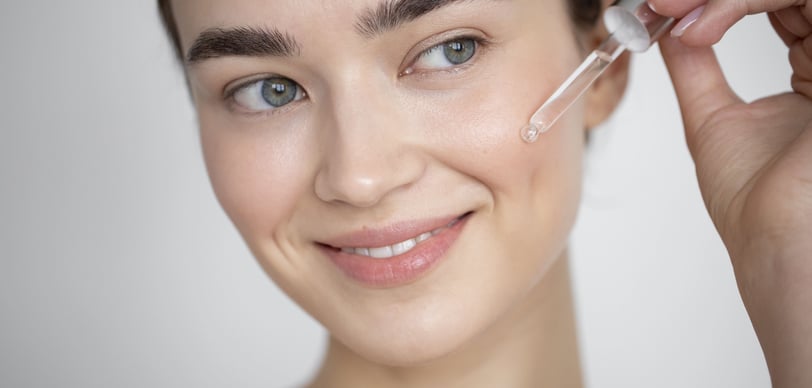

Introduction
Over the years Vitamin C has gotten more popular in the skincare industry and somehow has gotten into every skincare enthusiast vanity table and used in daily skincare routine beside other antioxidants and skincare ingredients that promise youthful appearance and glowing skin. Vitamin C based products from night creams, lotions, emugels, body scrubs to serums are been sought after by 65% of consumers according report in Times of India.
According to Statista on skincare products with keywords "best vitamin c serum" had 99,000 monthly searches in 2022. Vitamin C is among the top ten most searched skincare ingredients as of 2024. I think this trend will go up and up in the near future due to awareness on its benefits and availability thanks to evolving skincare industry. Even you have been searching for vitamin C in skincare and you got to land here. Now with no further ado let's jump in a delve into the world of vitamin C in skincare!
What Is Vitamin C in Skincare?
Vitamin C is a water-soluble vitamin and antioxidant also known as ascorbic acid or L-ascorbic acid (LAA). Vitamin C is can be naturally found in foods such as citrus fruits, red pepper, tomatoes, kiwifruit, raw broccolli and potatoes. You can also easily get your vitamin C from pill supplements, just consult your doctor before you start supplementing. Vitamin C is very important to the body's metabolism such as biosynthesis of collagen that is very important for skin health as explained in this article.
Vitamin C can not only be used internally as part of diet or supplements but also it can be applied in topically on the skin. Topical Vitamin C is now widely used in skincare due to its ability to support collagen production, lighten skin complexion, reduce effects of sun damage and promote overall skin health.
FUN FACTS
Deficiency of Vitamin C is called Scurvy, it was quite common among sailors in 18th century till Sir James Lind realized that eating citrus fruits can cure scurvy.
Millions of years ago primates and other human ancestors lost ability to synthesize vitamin C.
Tanzanite Skincare
Table of Contents
1.0 Introduction
1.1 What is Vitamin C in Skincare?
2.0 Benefits of Using Vitamin C in Skincare
2.1 Risks of Using Vitamin C in Skincare
3.0 Vitamin C Derivatives in Skincare
5.0 Vitamin C and Other Ingredients In Skincare
6.0 How to Include Vitamin C in Skincare Routine
7.0 Frequently Asked Questions (FAQ)
8.0 References
Benefits of Vitamin C in Skincare
After getting few insights about Vitamin C, it is good to know how important it is in skin health in order to build a consistent skincare routine with it. After using Vitamin C based skincare products you'll start to see changes from the first week to weeks and later months and appreciate the good results. Here are some of the benefits:
Boosts collagen production in the skin
Lightens dark spots
Prevents photo-aging
Reduces hyperpigmentation
Reduces appearance of fine lines and wrinkles
Promote healing and fade out scars
Anti-aging for the skin
1. Boosts Collagen Production in the Skin
Vitamin C when applied on the skin can increase the production of collagen and elastin. Vitamin C can also reduce degradation of collagen in the skin by an enzyme known as collagenase. It is good to know that collagen, a connective tissue especially collagen I and III (there are 28 types of collagen by far!) that is very important at giving you that plump look seen in young babies.
Collagen comes with elastin, elastin is what gives collagen flexibility, giving the skin elasticity it needs not being too taut, just soft and supple. In fact vitamin C can function at the cellular level to enhance mRNA levels of collagen.
Over the years especially when your reach in your 20s and beyond, you start losing collagen in the skin making it to sag. Dr. Amir Karam, MD in his YouTube channel had to say this on collagen production, "... from like 20 and beyond skin collagen production begins to decrease that's what the fibroblasts are actually doing they're just starting to get lazy and starting to decrease their production..". To avoid this adding vitamin C skincare regimen is very important to keep that youthful skin.
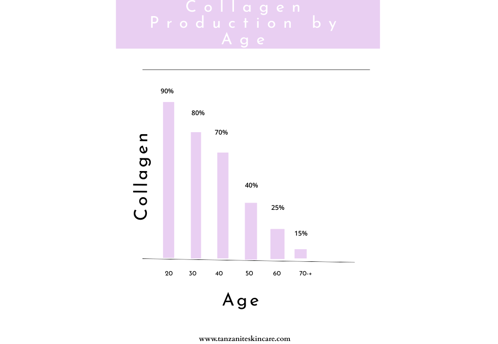

2. Lightens Dark Spots
Among the most sought after skin lighteners, vitamin C based products are not behind. From night creams and serums to lotions, vitamin C is considered generally safe for most skin types when it comes to lightening age spots, sun spots and other types of dark spots on the skin.
In a study of small group of individuals, magnesium L-ascorbyl-2-phospate, a type of vitamin C derivative, was used in their topical treatments and they found out that their dark spots had become lighter than before. Though we need to have more larger set of samples for studies to have coherent results to substantiate this claim.
3. Prevents Photoaging
Over time due to sun exposure your skin can start to age slowing. This aging process is known as photoaging. UV rays from the sun when they are constantly affecting your skin from staying outdoors for longer hours then this oxidative stress caused by free radicals builds up and ends up showing as skin aging.
Using vitamin C can prevent skin photoaging by quenching free radicals, since it's very potent antioxidant that can prevent skin cancer according to many clinical studies.
For those in ranges of I to III Fitzpatrick scale will see this changes earlier experiencing fine lines, wrinkles and age spots. On the other hand, IV to VI Fitzpatrick range may take a longer time due to higher melanin on their skin though photoaging inevitable. Sun damage can also exacerbate other skin conditions like psoriasis and rosacea.
UVA sun rays are the ones that cause your skin to tan. UVA degrade collagen and elastin, causing the skin to develop wrinkles and sagging.
UVB sun rays destroys skin cells and their DNA. It can cause melanoma and other types of skin cancers.
Tanzanite Skincare
4. Reduces Hyperpigmentation
Another concern that many people have is usually hyperpigmented skin. In order to reduce tanning discoloration and spots, adding vitamin C in your skincare routine. This can be well explained by dermatologist Dr. Simon Ourian as follows "so if you have a large pores, pigmentations, discoloration any kind of sun damage you have this is the right treatment for if you have that dull skin vitamin C is the right treatment for you..."
Vitamin C based products when used daily for about three months you'll see reduction of pigmented skin.
Vitamin C is a good and safe melanin synthesis inhibitor by regulating tyrosinase enzyme to not produce more skin melanin.
5. Reduce Appearance of Fine Lines and Wrinkles
It is no doubt that Vitamin C products can do this since they support the skin to build more collagen, as we already seen. Vitamin C can help your skin look youthful and more plump as part of skin health.
Vitamin C can also increase hydration and cell turnover under the skin that can make your skin more supple and less hollow due to increase in volume. This can be substantiated by a research study.
6. Promotes Healing and Fade out Scars
For those who have blemish prone-skin then Vitamin C can help to rebuild collagen and support cell migration to close of wounds. If your skin has blemishes, applying vitamin C can speeding healing of those micro cuts and prevent blemishes from re-appearing.
Vitamin C has brightening effect, so applying it can fade out or reduce appearance of scars and acne lesions that may be unsightly especially if they're located on the face.
7. Antiaging for the Skin.
By now you already know how important vitamin C, right? Vitamin C is very important vitamin with antioxidant properties and you'll notice a pattern that vitamin C is used in various metabolic activities than other types of vitamins.
From biosynthesis of proteins, (yeah, even collagen is!), improving body immunity, rejuvenating and increasing cell turnover and fighting off free radicals, this should tell you how important it is and why it a holy grail of anti-aging skincare products.
I think there are more benefits than the ones mentioned here like skin brightening, improving skin tone and more.
Risks of Using Vitamin C in Skincare
After getting to know the good part of vitamin C in skincare, you have to know every good thing comes with its own downsides too. Though this should not scare you at all on using Vitamin C based products in your skincare routine. With clear knowledge and guidance you can easily navigate and circumvent these issues. Some of the risks are
Irritation
Skin redness
Itching
Increase in skin UV sensitivity
It is always a good idea to know about your skin type, potency, type of vitamin C, combining vitamin C and other ingredients, storage, formulation and timing of using vitamin C before including it in your skincare regimen.
Now this blog post is all about that. We are going to explore all these things about vitamin C before you start using it in order to reduce its risks and benefit more from it.
Vitamin C Derivatives in Skincare
In skincare industry, getting to make formulation that work is very important. Despite Ascorbic Acid (AA) being able to help with collagen synthesis, skin brightening and other anti-aging activity for skin health ascorbic acid needs to be converted or encapsulated in a delivery vehicle that can deliver the vitamin C in the skin barrier. Some of the forms of vitamin C are
1. L-Ascorbic Acid (LAA)
L-Ascorbic Acid is the most potent vitamin C derivative with high anti-oxidant power than other derivatives. Various studies concluded that L-Ascorbic Acid
increased collagen type I and III
increased skin density
reduce skin redness
lightens skin
help with melasma and hyperpigmentation
There's one great downside when it comes to L-Ascorbic Acid. It is highly unstable and is affected by pH levels significantly. Thanks to skincare industry coming up with solutions on how to stabilize this derivative in formulations. Some of skincare products with l-ascorbic acid are
2. Ethyl Ascorbic Acid
Ethyl Ascorbic Acid also known as 3-O-Ethyl Ascorbic Acid (EAA) is another derivative of vitamin C that is very popular in skincare formulations than l-ascorbic acid and for the right reasons.
Ethyl ascorbic acid is more stable than ascorbic acid and l-ascorbic acid and can withstand a pH level of 7 to 8. It has higher bioavailability and soluble in both water and oil based formulations.
The EAA can help your skin with hyperpigmentation, skin brightening and all other benefits discussed in l-ascorbic acid. Though it has been reported to cause itching and contact dermatitis so do some patch testing. Some of popular skincare products with EAA
3. Ascorbyl Phosphates
Ascorbyl phosphates are salts of ascorbic acid that are not very potent as l-ascorbic acid but has one major advantage and that is being able to stay for quite long before degradation. In this article we will touch on Sodium Ascorbyl Phosphate (SAP) and Magnesium Ascorbyl Phosphate (MAP).
One study found out that applying Sodium Ascorbyl Phosphate (SAP) of 5% in lotion to participants showed significant improvement in acne and skin lightening. Some skincare products with sodium ascorbyl phosphate (SAP) are
Another salt of ascorbic acid is Magnesium Ascorbyl Phosphate (MAP). It is water soluble and stable up to pH 7. MAP was shown to have anti-aging properties which help to improve skin texture, reduce hyperpigmentation, reduce pore size and increased moisture in skin barrier.
MAP works well in cream formulation, this one is good one when looking at vitamin C face cream. Some of the skincare products containing magnesium ascorbyl phosphate are
4. Tetrahexyldecyl Ascorbate (THDA)
THDA is the only oil-soluble vitamin C derivative. I think it is very nice since it is compatible with lipophilic(oil-loving) skin barrier. It can penetrate the skin barrier and convert internally to ascorbic acid(AA). THDA is very good for mature skin since it can promotes collagen production even at lower concentrations. Consider using products like
5. Liposomal Vitamin C
As we already know ascorbic acid (AA) and other water soluble forms, are very potent antioxidant but not stable. So encapsulating them in liposomes for maximum absorption by the skin can be very beneficial. You could make one yourself at home, consider reading
Read More: DIY Liposomal Vitamin C Face Serum Recipe
They can deliver all the benefits like skin brightening, reduce hyperpigmentation and collagen production. Some of the skincare products with liposomal vitamin C are
Some of the vitamin C derivatives that are used in many other skincare products and work really well too. These include Ascorbyl Palmitate(AP), Ascorbyl Glucoside(AG), Ascorbyl Tetra Iso-palmitate(ATIP), Sodium Ascorbate and Glyceryl Ascorbate.
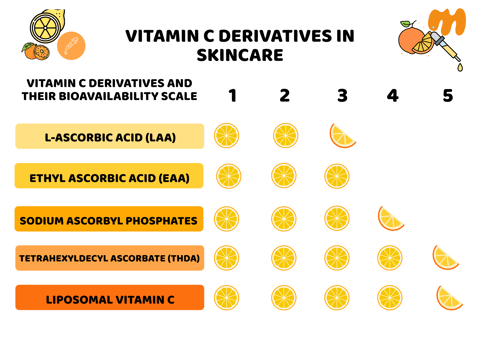

Vitamin C and Skin Types
Sensitive Skin
If you have sensitive skin these means that it is more prone to redness, irritation, itchiness and other skin allergies. You might also have a skincondition too that exacerbate the skin. After knowing risks that vitamin C may pose you may want to avoid it at all though there are derivatives of vitamin C that can be safe for your skin.
First is THDA and another I haven't mentioned it before and that is Aminopropyl Ascorbyl Phosphate(AAP). THDA reduce effects of UV damage and support collagen synthesis. Make sure to look out for this ingredients.
Here is the suggestion that Dr. Davin Lim had to offer, "...if you have sensitive skin types by all means tritated in so much like how you use vitamin C it's an oxidant start off with the low concentration 10 then build up to 15 and.." So concentration of vitamin C matters a lot too.
Oily Skin
For those with oily and acne prone skin should instead look for Sodium Ascorbyl Phosphate(SAP) in the ingredient list of the vitamin C skincare products. Look for lightweight formulations that won't clog your pores though SAP has antimicrobial properties to kill microbes, it is always to look for well-formulated product that can curb overproduction of sebum(oil) in your skin.
Dry Skin
Many people might think dry skin will benefit from water soluble formulations though this can be further from truth. After that being said, using SAP, Ascorbyl Glucoside and Glyceryl Ascorbate can real get the job done! They are good at hydrating the skin though look it in emulsion-based formulations. Look out of this ingredients in your skincare products to see if they suit your needs.
Combination Skin
Combination skin comes with challenges experienced by both dry and oily skin. You can there fore look for SAP, MAP, Ascorbyl Glucoside and THDA. You can use one ingredient during the day and the other during the evening to reap more benefits and achieve your skincare goals!
Normal Skin
Lucky you! If you have normal skin you can always find something that suit your needs at a particular time. Maybe during the summer you may prefer something with skin lightening properties such as Magnesium Ascorbyl Phosphate(MAP) and do another ingredient during another season. You more freely explore many skincare products if you have normal skin.
For those with other skin types other than normal skin type can always bring their skin to a more balanced skin with proper care overtime.
If you have mature or aging skin, you're not forgotten! THDA is the best choice for boosting collagen while MAP and Ascorbyl Tetra Iso-Palmitate(ATIP).
Vitamin C and Other Ingredients In Skincare
In skincare Vitamin C is very important and cannot be left out in any skincare routine. But here's the catch, Vitamin C can work best when combined with other ingredients. But also some ingredients need to be used with caution. Let's see here how Vitamin C works in a team!
1. How to Use Vitamin C and Retinol(Vitamin A)
Vitamin C and Vitamin A can actually be used together in the same skincare routine but with caution. Here, choosing vitamin A derivatives matter. Tretin-A is very potent so mixing it with vitamin C may cause skin redness and irritation.
Though most of the times you're likely to use vitamin C during the daytime and apply SPF too. If in your skincare you'll use SPF then vitamin A like Tretin-A, adapalene, retinyl palmitate and retinol can not be mixed.
But during the night time skincare routine, you can use them both starting with vitamin C serum followed by retinol cream. This is well substantiated by research studies.
2. How to Use Vitamin C and Vitamin E and Ferulic Acid
This is the perfect combo in any skincare routine. Vitamin C can work synergistically with Vitamin E to make vitamin C even more potent and produce more positive skincare results. Notable example of this product is SkinCeuticals Serum 10 Aox+, though it come with hefty price tag!
On the other hand, Ferulic acid also known as Vitamin F work by lowering the pH, creating a conducive environment for vitamin C which works best at pH level of around 3,5.
3. How to Use Vitamin C and Niacinamide(Vitamin B3)
These two ingredients have shown no significant skin problems that can scare you off from using them together. They can work together to promote skin health and have no issue when it comes to formulating them since both are water soluble.
Sometimes niacinamide is combined in skincare products presented as vitamin C-based with another active ingredient being niacinamide.
4. How to Use Vitamin C and Panthenol(Provitamin B5)
Again this ingredient, panthenol is less likely to cause skin problems and sometimes is found together with Vitamin C as seen in skincare product Jeuvenile Liposomal Vitamin C %17 + Hyaluronic Acid %1 + Panthenol %3 C Face Serum
Panthenol can help to moisturize the skin barrier and reduce the side effects of vitamin C such as irritation. It works best for cream formulation. This combo can be used with sensitive skin types with less concern.
5. How to Use Vitamin C and SPF
If you're going to use vitamin C in your morning skincare routine then it'll be a good idea to incorporate with sunscreen so that vitamin C UV protection and lightening properties may be preserved. You may delay seeing vitamin C results if you don't apply SPF since the results get damaged as soon as the sun rays hit your skin.
Vitamin C can be used with plethora of other skincare ingredients due to how important it is in overall skin health. It can be incorporated with peptides for faster collagen production as in case of Matrixyl 3000 and skin lightening.
But also hydroxyl acids(AHAs, BHAs and PHAs) can be used with vitamin C though, again for those with sensitive skin, skin conditions or skin allergies should avoid this route.
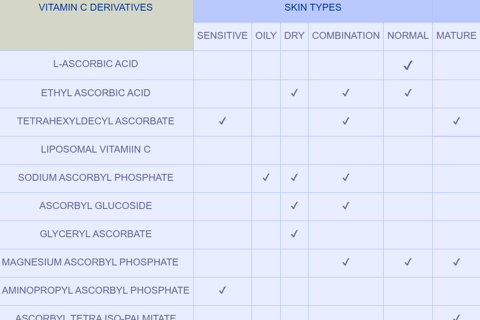

How to Include Vitamin C in Skincare Routine
One thing many peple forget when it comes to skincare ingredients is that, not all ingredients are meant to be used or formulated in a particular way. When it comes to vitamin C, leave on formulation are the best! Wash off/rinse out formulation are more likely to work.
The reason being clearly that vitamin C has to stay on the skin and penetrate to observe any results so when you find face cleanser or face wash with vitamin C is just a rip off! In such products vitamin C has no significant use other than being the marketing gig, that's why you should always educate yourself before buying any skincare product.
Simple skincare routine will have 3 to 4 steps max for more effective and consistent routine that won't bore and make you quit sooner. These steps are
Cleansing
Vitamin C Serum
Moisturizer(night time)/SPF(daytime)
With this three steps you can have simple yet effective skincare routine.
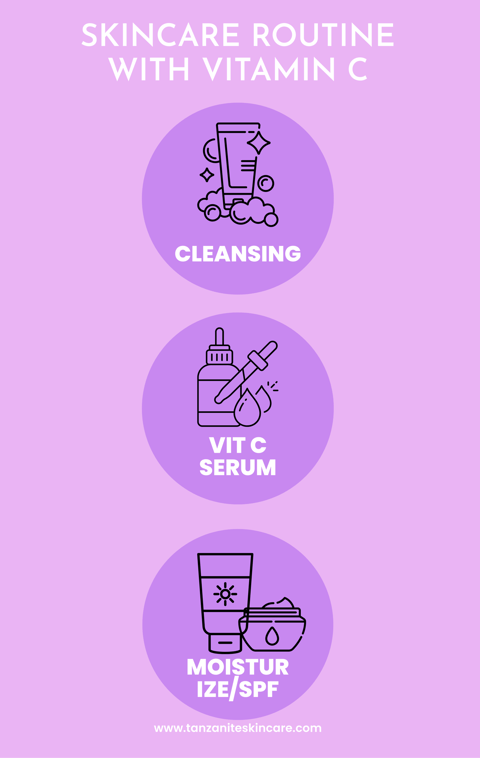

Frequently asked questions
How Vitamin C works?
Vitamin C works by scavenging free radicals that can harm the body, these free radicals come from UV exposure or pollution. But also it can inhibit an enzyme called tyrosinase thus reducing melanin production creating a lighter skin complexion or simply lighten the dark spots on the skin.
How to store my Vitamin C serum or cream?
First of all, find a brand that offer packaging that does not allow air or light to pass through it. Look for Vitamin C serum and creams in amber glass containers with airless pump. Store it in clean and dry place with no direct sunlight.
How will I know when my Vitamin C serum or cream goes bad?
If it has yellowish, brown or other color that is different from when you bought it with a peculiar bad smell then throw it away.
How to avoid mistakes while using Vitamin C serum?
Avoid the dropper contacting the skin since it may carry bacteria and once you return it back to the bottle and close it, may start to breed bacteria in there. Also do not place the dropper on other unclean surfaces like the vanity table even though you clean it, it is likely to have bacteria that can damage your serum.
When should I use my Vitamin C serum or cream?
For best results vitamin C serum can be used in morning routine(AM) followed by B5 or hyaluronic acid moisturizer and SPF. You can use Vitamin C night cream in the evening routine(PM) for more benefits.
References
Oormila Sasidharan, Anjali Gholap, Rachna Rastogi. A Review of Clinical Efficacy of Topical Vitamin C and Its Derivatives. Pharmaceutical Science and Technology. Vol. 7, No. 2, 2023, pp. 20-26. doi: 10.11648/j.pst.20230702.11
Patricia K Farris, et al. (2005). Topical vitamin C: a useful agent for treating photoaging and other dermatologic conditions https://pubmed.ncbi.nlm.nih.gov/16029672/
Anna Saroj-Sadza, et al. (2024). Ascorbic Acid Treatments as Effective and Safe Anti-Aging Therapies for Sensitive Skin https://www.mdpi.com/2076-3921/13/2/174
Neera Nathan MD,MSHS and Payal Patel, MD. (2024). Why is topical vitamin C important for skin health? https://www.health.harvard.edu/blog/why-is-topical-vitamin-c-important-for-skin-health-202111102635
Firas Al-Niaimi, MRCP(UK)(Derm), and Nicole Yi Zhen Chiang, MRCP(UK)(Derm). (2017). Topical Vitamin C and the Skin: Mechanisms of Action and Clinical Applications https://jcadonline.com/topical-vitamin-c-and-the-skin-mechanisms-of-action-and-clinical-applications/
Rizwan M Sanadi, et al. (2020). The effect of Vitamin C on melanin pigmentation – A systematic review https://pmc.ncbi.nlm.nih.gov/articles/PMC7802860/
Heather Wooley-Lloyd, MD, et al. (2010). Sodium L-ascorbyl-2-phosphate 5% lotion for the treatment of acne vulgaris: a randomized, double-blind, controlled trial https://onlinelibrary.wiley.com/doi/10.1111/j.1473-2165.2010.00480.x
Myoung Jin Ho, et al. (2023). Neutral Oil-Incorporated Liposomal Nanocarrier for Increased Skin Delivery of Ascorbic Acid https://pmc.ncbi.nlm.nih.gov/articles/PMC10051652/
Aleksandra Stolić Jovanović, et al. (2024). Liposomal Encapsulation of Ascorbyl Palmitate: Influence on Skin Performance https://www.mdpi.com/1999-4923/16/7/962
Juliet M Pullar, et al. (2017). The Roles of Vitamin C in Skin Health https://pmc.ncbi.nlm.nih.gov/articles/PMC5579659/
